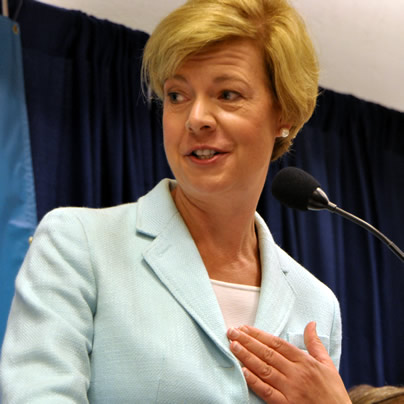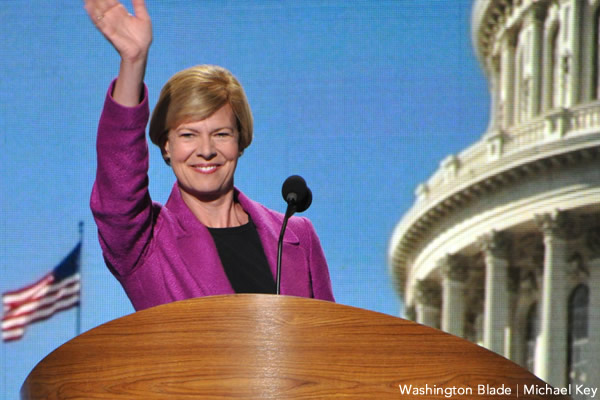News
Baldwin makes history with Wisconsin Senate victory
First openly gay member of the Senate

Lesbian Rep. Tammy Baldwin has won her race for the U.S. Senate from Wisconsin in a historic first for the LGBT community. She becomes the first openly gay person to serve in the Senate.
With 77 percent of precincts reporting, Baldwin was leading former Wisconsin Gov. Tommy Thompson, 51-46 percent.
“I am honored, and humbled, and grateful,” Baldwin said in election night remarks. ” And I am ready to get to work. Ready to stand with President Barack Obama. Ready to fight for Wisconsin’s middle class!”
Early polls showed Thompson with a slight lead over Baldwin shortly after Thompson won the GOP nomination in a primary in August. By the middle of September, polls showed Baldwin in the lead, but the size of her lead narrowed by late October, with some pollsters saying the two candidates were in a statistical tie going into Tuesday’s election.
Baldwin’s quest to become the nation’s first openly gay U.S. senator captured the attention of the LGBT people across the country, many of whom contributed money to Baldwin’s campaign.
She also received backing from the Democratic Senatorial Campaign Committee and other Democratic leaning groups, including labor unions and environmental organizations.
In 1998, Baldwin became the first openly gay non-incumbent to win election to the U.S. House when she won her race for Wisconsin’s Second Congressional District in which the state capital of Madison is located.
In her seven terms in Congress, Baldwin became known as one of the strongest advocates of LGBT rights in the House as well as one of the strongest champions of progressive causes and policies.
Thompson, whose supporters describe him as a moderate, served as governor of Wisconsin between 1987 and 2001. He served as Secretary of the U.S. Department of Health and Human Services in the Bush administration from 2001 to 2005. He became a candidate for the Republican presidential nomination in 2008 but dropped out of the race before the start of the primaries.
Thompson has said he personally opposes same-sex marriage and supports the Defense of Marriage Act, which defines marriage under federal law as a union only between a man and a woman. But he has said he doesn’t favor a constitutional amendment to ban marriage equality and favors leaving same-sex marriage decisions to the states.
He has said he opposes workplace discrimination based on someone’s sexual orientation but has not said whether he would support federal legislation to ban anti-LGBT discrimination in the workplace.
Although Wisconsin members of the gay Republican group Log Cabin Republicans are supporting Thompson, the national Log Cabin organization, which endorsed GOP presidential candidate Mitt Romney for president, didn’t endorse Thompson.
“We endorsed candidates that engaged with us and asked for our endorsement,” said Log Cabin president R. Clarke Cooper, who noted that the group endorsed just four U.S. Senate candidates this year.
The outcome of Tuesday’s Senate election in Wisconsin marked the end of a bruising campaign, which the Milwaukee Journal Sentinel says may have broken a national record for the most negative TV ads of any U.S. Senate campaign in the state and possibly in the nation.
The Journal Sentinel reports that both Baldwin and Thompson appear to have lashed out at each other with equal force, with some independent observers saying some of the ads from both sides included misleading information.
None of the Thompson attack ads appear to have singled out Baldwin based on her sexual orientation.
However, in at least one instance, a Thompson campaign official sent an email to the news media in early September, one day before Baldwin spoke before the Democratic National Convention in Charlotte, N.C., highlighting Baldwin’s appearance at an LGBT Pride festival in Madison several years earlier.
The email, sent by Thompson campaign staffer Brian Nemoir, included an attached YouTube video showing Baldwin waiving her arms while dancing on a stage with the popular Wisconsin rock band V05. Some of the band members were dressed in Wonder Woman costumes as the band played the theme song for the Wonder Woman TV series.
Nemoir stated in his email that Baldwin was scheduled to discuss “heartland values” in her Democratic Convention speech.
“Clearly, there’s no one better positioned to talk ‘heartland values’ than Tammy,” he said in the email.
Baldwin supporters called the email a form of gay baiting, saying it was an attempt to question Baldwin’s values because she appeared at an LGBT Pride event. A Thompson campaign spokesperson said Nemoir was acting as an individual and not on behalf of the campaign when he sent the email and video.
While the Thompson campaign’s negative TV ads steered clear of Baldwin’s sexual orientation, they sought to portray her as an ultra liberal politician out of touch with the needs of the state and the country.
One ad pointed to Baldwin’s longstanding support for a single payer health insurance system, quoting her as saying several years ago that the single payer system she supported is a “government takeover of medicine.” Another ad noted that Baldwin voted four times against economic sanctions for Iran, criticizing her judgment on a key foreign policy issue.

U.S. Senate Candidate Rep. Tammy Baldwin (D-Wisc.) speaking at the Democratic National Convention in Charlotte, N.C. (Blade file photo by Michael Key)
Baldwin responded to the health insurance attack by saying she voted for and continues to support the Affordable Care Act, President Obama’s health insurance reform measure that Congress passed two years ago. She said her support for a single payer system was “moot” since the Obama measure is about to be implemented.
She said she voted against sanctions for Iran at a time when she was hopeful that dissident groups in Iran would overturn Iran’s government and establish a true democratic system. She said she began voting for sanctions after determining that the opposition forces didn’t have the strength to change the government.
A Thompson campaign attack ad that drew expressions of outrage from Baldwin’s campaign and its supporters showed video footage of the devastation of the World Trade Center in New York following the Sept. 11, 2001 terrorist attacks and denounced Baldwin for voting against a 2006 House resolution honoring victims of the attacks.
Baldwin said she voted for at least four other 9/11 resolutions honoring victims of the terrorist attacks but voted against the 2006 resolution because it included other provisions on unrelated issues with which she disagreed.
In her own TV ads, Baldwin fired back at Thompson, citing reports by New York firefighters saying the U.S. Department of Health and Human Services, which Thompson headed at the time of the 9/11 attacks, was slow in responding to firefighters’ calls for assistance for their illnesses believed to be caused by the fumes and contaminated dust that engulfed them while responding to the World Trade Center disaster.
Another Baldwin ad criticized Thompson for profiting from the 9/11 tragedy when he became president of a private medical related company that obtained an $11 million federal government contract to assist victims of the attack. Thompson joined the company after leaving his post as HHS Secretary.
A separate Baldwin ad attacked Thompson for having personal investments in companies that do business with Iran. Thompson said the investments were in stock, which he said he immediately sold when he learned the companies that issued the stock had investments linked to Iran.
“In one of the most phenomenally negative years ever, the Wisconsin Senate race stands out this fall as perhaps the most negative race in the entire country,” the Journal Sentinel quoted Ken Goldstein, a political scientist and observer of Wisconsin politics, as saying.
District of Columbia
Gay ANC member announces candidacy for Ward 1 D.C. Council seat
Community leader Brian Footer seeking seat held by Brianne Nadeau

Gay Advisory Neighborhood Commissioner Brian Footer, a community activist who has been involved for many years in local and national government affairs, has announced his candidacy for the Ward 1 D.C. Council seat up for election in 2026.
Footer, a Democrat, will be running in the city’s June 2, 2026, Democratic primary for the Ward 1 Council seat, but it is uncertain whether he will be running against incumbent Ward 1 Council member Brianne Nadeau (D). Nadeau has not yet announced if she plans to run for re-election for a fourth term following her 12 years on the Council.
Nadeau has been a longtime vocal supporter of the LGBTQ community.
If Footer were to win the primary and the November 2026 general election, he would become the Council’s second openly gay member. Ward 5 Council member Zachary Parker (D) is currently the 13-member Council’s only gay member.
Footer is a three-term ANC commissioner who currently serves as Chair of ANC 1E, which represents the city’s Adams Morgan neighborhood.
“Brian has worked at every level of government — federal, state, and local — building a career rooted in public service, aging policy, and inclusive urban planning,” a statement on his campaign website says.
“I’m running for Council because too many people in Ward 1 are doing everything right and still feel ignored by the city they call home,” Footer states on his website.
“I’m running because we can do better,” his statement continues. “That means making housing more affordable, addressing homelessness with real solutions, and keeping our neighborhoods safe with smart, community focused strategies.”
When contacted by the Washington Blade for comment, Nadeau said she was not ready at this time to discuss her plans about running again or about Footer’s candidacy.
“The primary is a ways away, and I’m very focused right now on the budget and the stadium deal and all the work that we’re doing at the Council,” she told the Blade. “So, I really haven’t had time to turn to my plans. So, as a result, I’m also not going to be commenting on anybody else who is determined that they’re running at this time.”
She first won election to the Council in 2014 after she defeated four-term gay Ward 1 Council member Jim Graham in the Democratic primary after Graham became embroiled in an ethics controversy.
In the 2022 Democratic primary Nadeau defeated gay challenger Salah Czapary in a three-candidate race, by a margin of 48.5% of the vote compared to Czapary’s 30.9%.
With the third candidate, Sabel Harris, receiving 20.4%, the outcome showed that the two challengers had a combined total vote count higher than Nadeau.
Further details of Footer’s candidacy can be accessed from his campaign website, brianfooterdc.com.
Spain
Spanish women detail abuses suffered in Franco-era institutions
Barcelona-based photographer Luca Gaetano Pira created ‘Las Descarriadas’ exhibit

A Barcelona-based photographer, audiovisual artist, and activist has created an exhibit that profiles Spanish women who suffered abuse in institutions that Gen. Francisco Franco’s dictatorship established.
Luca Gaetano Pira, who is originally from Italy, spoke with women who the regime, which governed Spain from 1936-1975, sent to Women’s Protection Board institutions.
The regime in 1941 created the board the country’s Justice Ministry oversaw.
Franco named his wife, Carmen Polo, as the board’s honorary president. Then-Prime Minister Felipe González fully dissolved the board in 1985, a decade after Franco’s death.
Gaetano’s exhibit is called “Las Descarriadas” or “The Misguided Women” in English.
“These are women who were detained between 1941 and 1985 for reasons that are unthinkable today: being lesbian, poor, pregnant out of wedlock, rebellious, politically active … or simply considered ‘morally suspect,'” Gaetano noted to the Washington Blade.
Groups affiliated with the Spanish Catholic Church ran these institutions. Gaetano pointed out they were “presented as social assistance centers.”
“In reality, they were spaces of punishment and forced reeducation, where isolation, unpaid work, and psychological violence were the norm,” he said. “Many of the survivors are still alive. Their testimonies are powerful, urgent, and of extraordinary current relevance.”
The regime sent more than 40,000 women to Women’s Protection Board institutions.
“Despite its seemingly benevolent name, it was in fact one of the most powerful instruments of moral and social control over women during and after the dictatorship,” notes the exhibit. “Under the guise of care and re-education, this institution functioned as a repressive apparatus that punished women who deviated from the ideal feminine model imposed by Franco’s regime: submissive, obedient, married, and dedicated to motherhood within the Catholic family structure.”
The Spanish Catholic Church last month issued a public apology, but Gaetano described it as “very soft” and noted “the women did not accept it.” Gaetano also compared the Women’s Protection Board institutions to Ireland’s Magdalene Laundries.
The Associated Press notes tens of thousands of “fallen” women were sent to the laundries that Catholic nuns operated in Ireland from the 18th century until the mid-1990s. Then-Irish Prime Minister Edna Kenny in 2013 issued a formal apology for the abuses that women suffered in the laundries and announced the government would compensate them.
The Spanish government has yet to offer compensation to the women abused in Women’s Protection Board institutions.
“My work focuses on recovering the historical memory of marginalized communities, particularly through the portrayal of survivors of institutional violence and the use of archival materials,” Gaetano told the Blade, noting he has also sought to highlight the repression that LGBTQ people suffered during dictatorships in Portugal and Latin America.
Gaetano’s exhibit can be found here:
District of Columbia
Gay GOP group hosts Ernst, 3 House members — all of whom oppose Equality Act
Log Cabin, congressional guest speakers mum on June 25 event

U.S. Sen. Joni Ernst (R-Iowa) and three women Republican members of the U.S. House appeared as guest speakers at the June 25 meeting of Log Cabin Republicans of D.C., the local chapter of the national LGBTQ Republican group with that same name.
The U.S. House members who joined Ernst as guest speakers at the Log Cabin meeting were Celeste Maloy (R-Utah), Kat Cammack (R-Fla.), and Julia Letlow (R-La.).
Neither D.C. Log Cabin Republicans President Andrew Minik nor spokespersons for Ernst or the three congresswomen immediately responded to a request by the Washington Blade for comment on the GOP lawmakers’ appearance at an LGBTQ GOP group’s meeting.
“Please join us for an inspiring evening as we celebrate and recognize the bold leadership and accomplishments of Republican women in Congress,” a D.C Log Cabin announcement sent to its members states.
“This month’s meeting will highlight the efforts of the Republican Women’s Caucus and explore key issues such as the Protection of Women and Girls In Sports Act and the broader fight to preserve women’s spaces in society,” the message says.
It was referring to legislation pending in Congress calling for banning transgender women from participating in women’s sports events.
According to media reports, Ernst and the three congresswomen have expressed opposition to the Equality Act, the longstanding bill pending in Congress calling for prohibiting discrimination based on sexual orientation and gender identity in the areas of employment, housing, and public accommodations.
The Log Cabin announcement says the meeting was scheduled to take place at the Royal Sands Social Club, which is a restaurant and bar at 26 N St., S.E. in the city’s Navy Yard area.
D.C. Log Cabin member Stuart West, who attended the meeting, confirmed that Ernst and the three congresswomen showed up and spoke at the event.
“It was a good turnout,” he said. “I would definitely say probably 30 or 40 people attended.” West added, “Four women came to talk to a group of mostly gay men. That’s something you don’t see very often.”
-

 Federal Government2 days ago
Federal Government2 days agoTreasury Department has a gay secretary but LGBTQ staff are under siege
-

 Virginia3 days ago
Virginia3 days agoDefying trends, new LGBTQ center opens in rural Winchester, Va.
-

 District of Columbia2 days ago
District of Columbia2 days agoGay GOP group hosts Ernst, 3 House members — all of whom oppose Equality Act
-

 Opinions4 days ago
Opinions4 days agoUSAID’s demise: America’s global betrayal of trust with LGBTQ people












